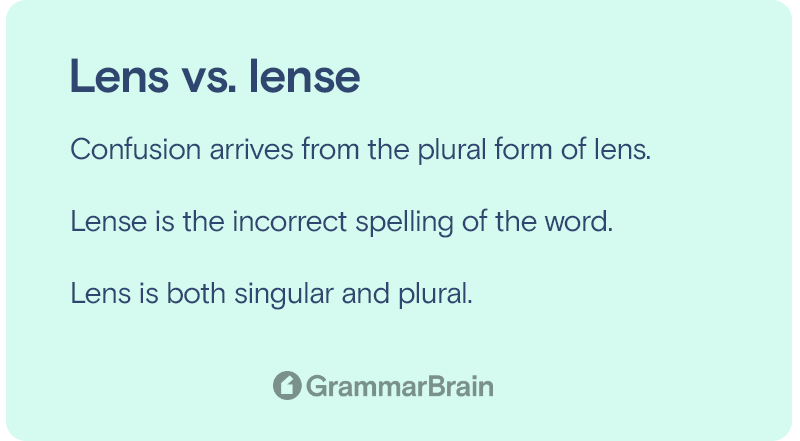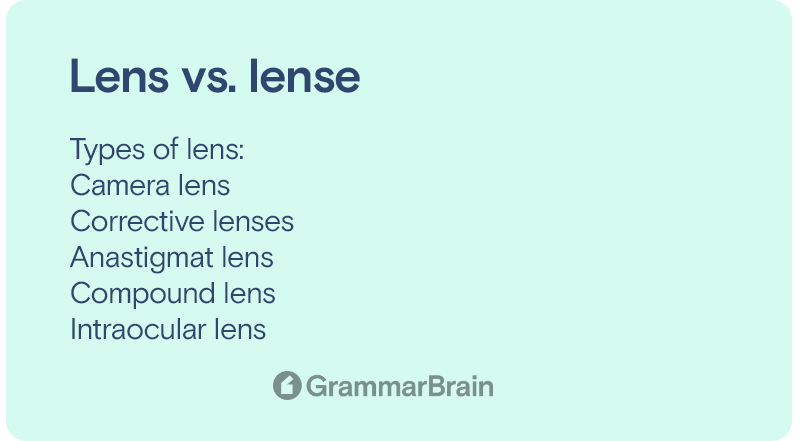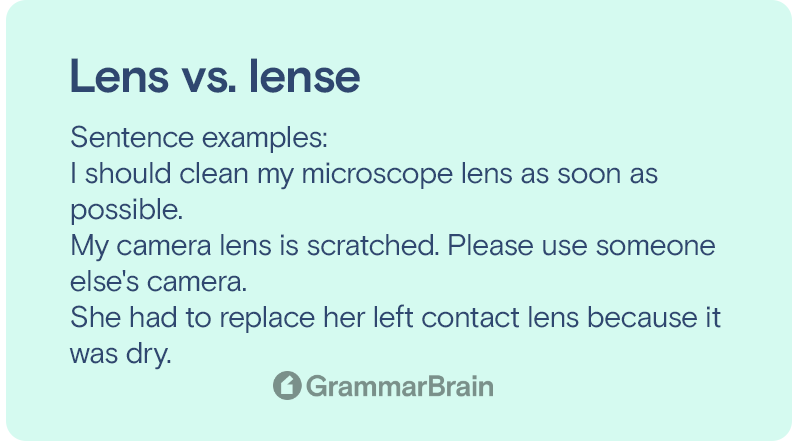Is it lens or lense? Many words in English can be spelled in more than just one way. And this matter often becomes tempting to think that even lens have multiple official spellings. However, that is certainly not the case when it comes to lens spelling. Lens simply has one standard spelling.
But the confusion between the spelling lens and lense arrives from the plural form of the word lens. This is because the plural form of the lens is lenses. Thus, some people assume that the correct singular form of the word lens can be spelled as a lense.
Let me tell you that it is not how it works for the word lens. Today, in this post, we are going to discuss all you need to know about the difference between lens and lense.

Definition: What’s a Lens?
The term lens is used to describe a transparent surface that has primarily been made so that it can concentrate or disperse light rays. A lens can be convex or concave depending on the curving direction.
So, a lens denotes a curved glass used typically in cameras and devices that help with vision. It can be a camera lens or an optical lens. Let’s see the singular and plural forms of the word “Lens.”
Correct Singular:
The singular form is spelled as ‘lens’ and not ‘lense.’ There is only one correct spelling, and that is lens. Examples include a camera lens or a magnifying glass lens.
Correct Plural:
The word ‘lenses’ is the correct plural form of lens. Examples include binocular lenses or eyeglass lenses.
Types of Lenses
A “lens” can be of various types, which contain:
- Camera lens
- Corrective lenses
- Anastigmat lens
- Compound lens
- Intraocular lens
- Contact lens
- Ocular Lens
- Optical condenser
- Diverging or concave lens
- Converging lens or convex lens
Is The Use Of The Word Lense Incorrect?
The lense isn’t an accurate word at all. Thus, it is better not to use it ever. Instead, it’s just an incorrect form to spell ‘lens.’
Here are a few samples:
- Although I got the perfect frames, I still have to find the perfect lense for my new monocle. (Here, you should instead use ‘lens’)
- To take close-up photos, I need to purchase a macro lense. (Here, you should instead use a macro lens)
NOTE:
Since the plural form of lens is spelled as lenses, often people get confused and write lense instead of lens. Don’t do the same mistake as others.

Lens vs. Lense: What Is The Main Difference?
The main difference between lens and lense is the former spelling is the correct one, and the latter one is a misspelling. The word lense isn’t an accurate word and is only a result of a misspelling. On the other hand, the word lens is the only correct spelling. So, always use the word lens (without “e”) to mean singular form. However, if it is plural, then you should include -es at the end, and thus, the spelling will be lenses.
When To Use “Lens”
Well, the noun “Lens” is a common use and recorded in all dictionaries out there. For the singular form, you always need to write lens. This defines a curved glass piece, usually round, used to see things through the glass, such as cameras or other scientific tools.
The lens is the only one correct spelling, and it is spelled “lenses” to use the plural form.
For Example:
- I need to buy a new pair of lenses for me
- I need a macro lens for my camera
When To Use “Lense”
Never use lense! “Lense” is just a misspelling that appeared due to the confusion of the plural form of lens. You shouldn’t use “lense,” because it doesn’t exist in the dictionary, and it is nothing but a misspelling.

Examples of Lens in Sentences: Both Singular & Plural
Explore some sample sentences using lens and lenses.
- I should clean my microscope lens as soon as possible.
- My camera lens is scratched. Please use someone else’s camera.
- She had to replace her left contact lens because it was dry.
- Her new camera features a wide-angle lens.
- Rachel loves to use different kinds of camera lenses to capture nature’s beauty.
- Your old contact lenses are damaged, you need to buy a new pair.
In summary
Hope you understand the difference between lens and lense now. And we also hope that you will never use the word ‘lense’ in place of using ‘lens.’
FAQs
Is lense a correct Word?
No. It is a misspelling of the lens. Thus, you should never use the word lense.
Is the lens singular or plural?
Lens is the singular form of the word, while the plural form is lenses.
Inside this article
Fact checked:
Content is rigorously reviewed by a team of qualified and experienced fact checkers. Fact checkers review articles for factual accuracy, relevance, and timeliness. Learn more.
Core lessons
Glossary
- Abstract Noun
- Accusative Case
- Anecdote
- Antonym
- Active Sentence
- Adverb
- Adjective
- Allegory
- Alliteration
- Adjective Clause
- Adjective Phrase
- Ampersand
- Anastrophe
- Adverbial Clause
- Appositive Phrase
- Clause
- Compound Adjective
- Complex Sentence
- Compound Words
- Compound Predicate
- Common Noun
- Comparative Adjective
- Comparative and Superlative
- Compound Noun
- Compound Subject
- Compound Sentence
- Copular Verb
- Collective Noun
- Colloquialism
- Conciseness
- Consonance
- Conditional
- Concrete Noun
- Conjunction
- Conjugation
- Conditional Sentence
- Comma Splice
- Correlative Conjunction
- Coordinating Conjunction
- Coordinate Adjective
- Cumulative Adjective
- Dative Case
- Determiner
- Declarative Sentence
- Declarative Statement
- Direct Object Pronoun
- Direct Object
- Diction
- Diphthong
- Dangling Modifier
- Demonstrative Pronoun
- Demonstrative Adjective
- Direct Characterization
- Definite Article
- Doublespeak
- False Dilemma Fallacy
- Future Perfect Progressive
- Future Simple
- Future Perfect Continuous
- Future Perfect
- First Conditional
- Irregular Adjective
- Irregular Verb
- Imperative Sentence
- Indefinite Article
- Intransitive Verb
- Introductory Phrase
- Indefinite Pronoun
- Indirect Characterization
- Interrogative Sentence
- Intensive Pronoun
- Inanimate Object
- Indefinite Tense
- Infinitive Phrase
- Interjection
- Intensifier
- Infinitive
- Indicative Mood
- Participle
- Parallelism
- Prepositional Phrase
- Past Simple Tense
- Past Continuous Tense
- Past Perfect Tense
- Past Progressive Tense
- Present Simple Tense
- Present Perfect Tense
- Personal Pronoun
- Personification
- Persuasive Writing
- Parallel Structure
- Phrasal Verb
- Predicate Adjective
- Predicate Nominative
- Phonetic Language
- Plural Noun
- Punctuation
- Punctuation Marks
- Preposition
- Preposition of Place
- Parts of Speech
- Possessive Adjective
- Possessive Determiner
- Possessive Case
- Possessive Noun
- Proper Adjective
- Proper Noun
- Present Participle
- Prefix
- Predicate



